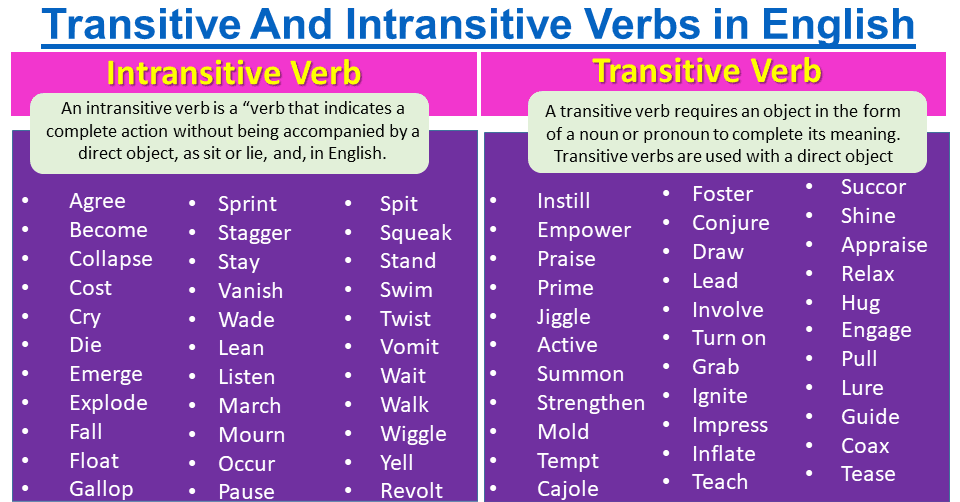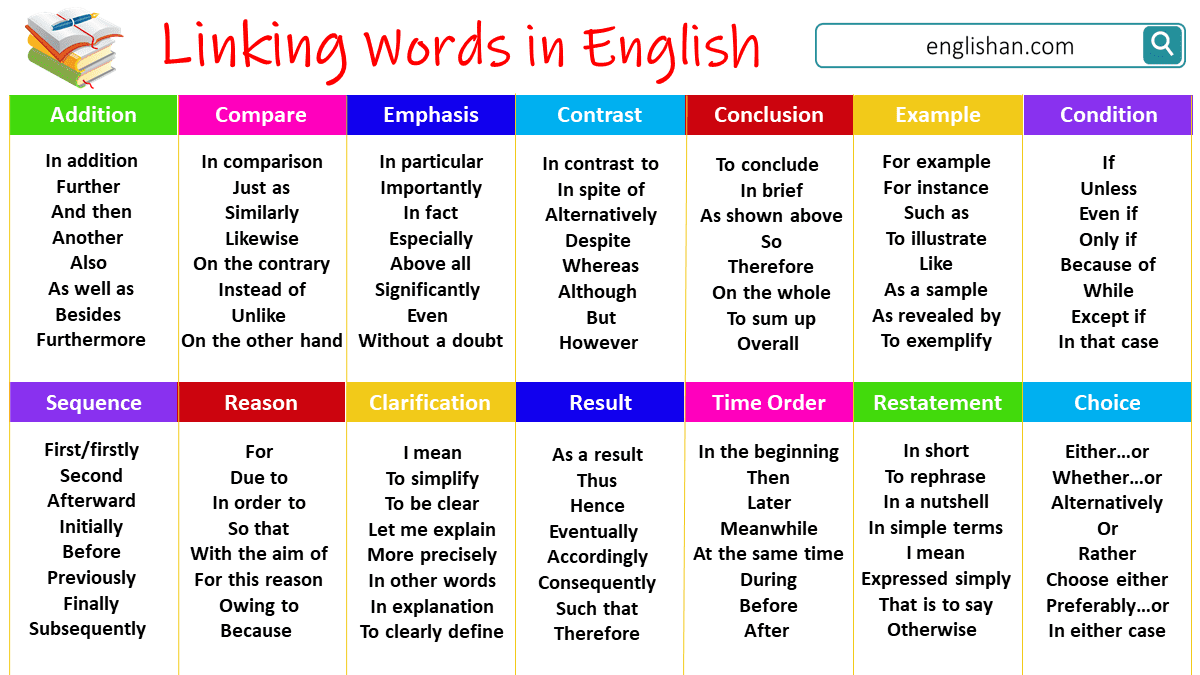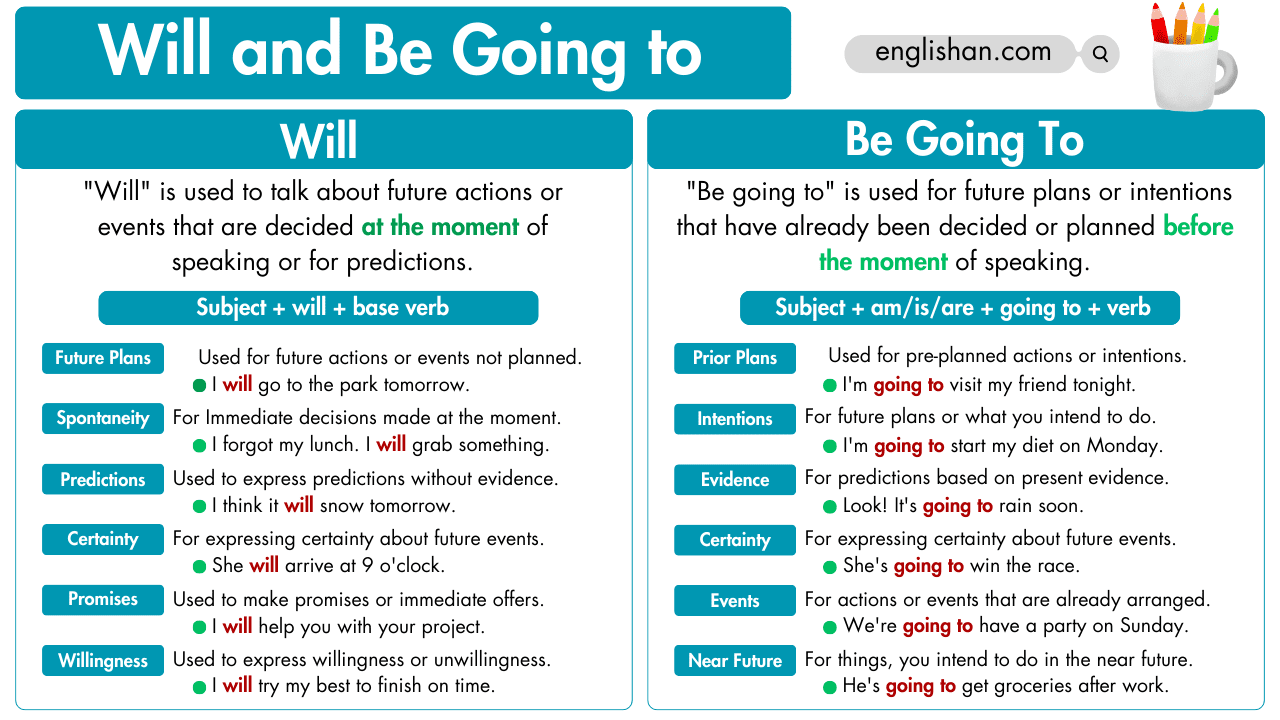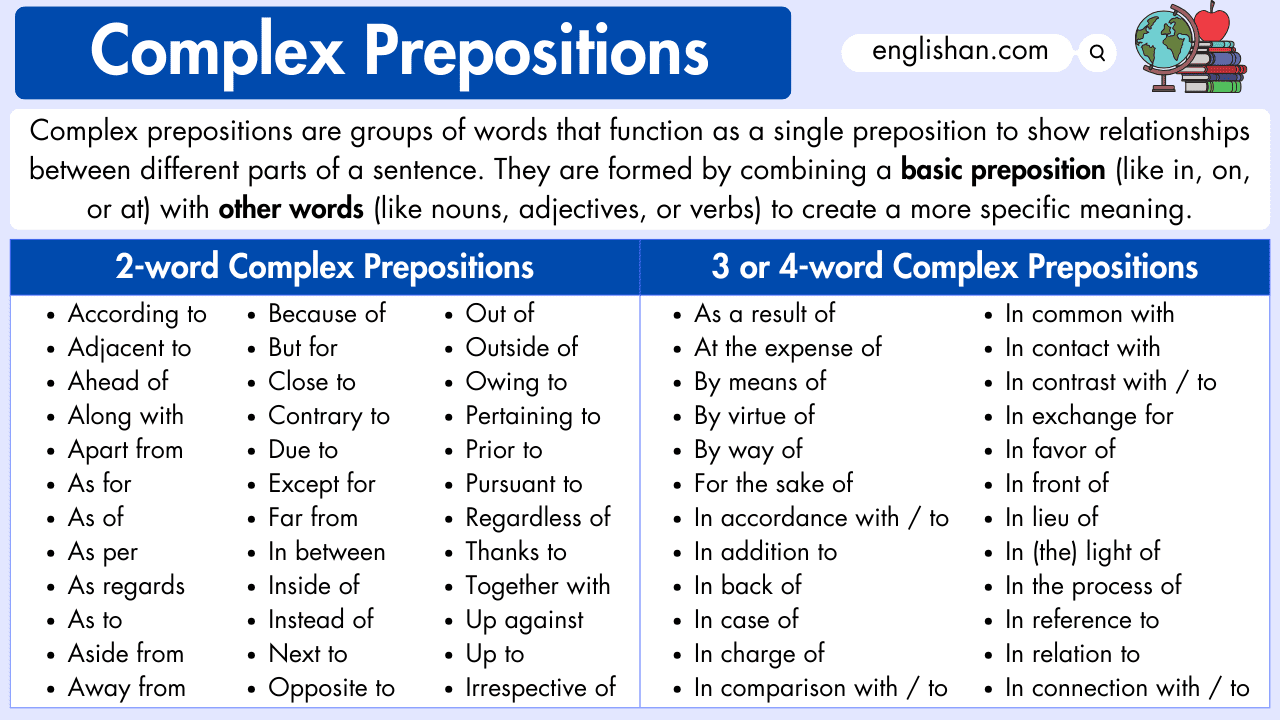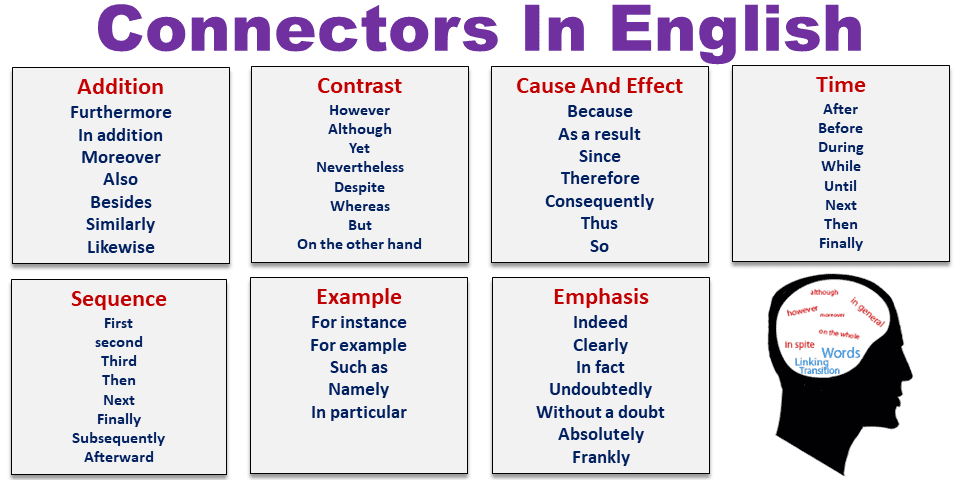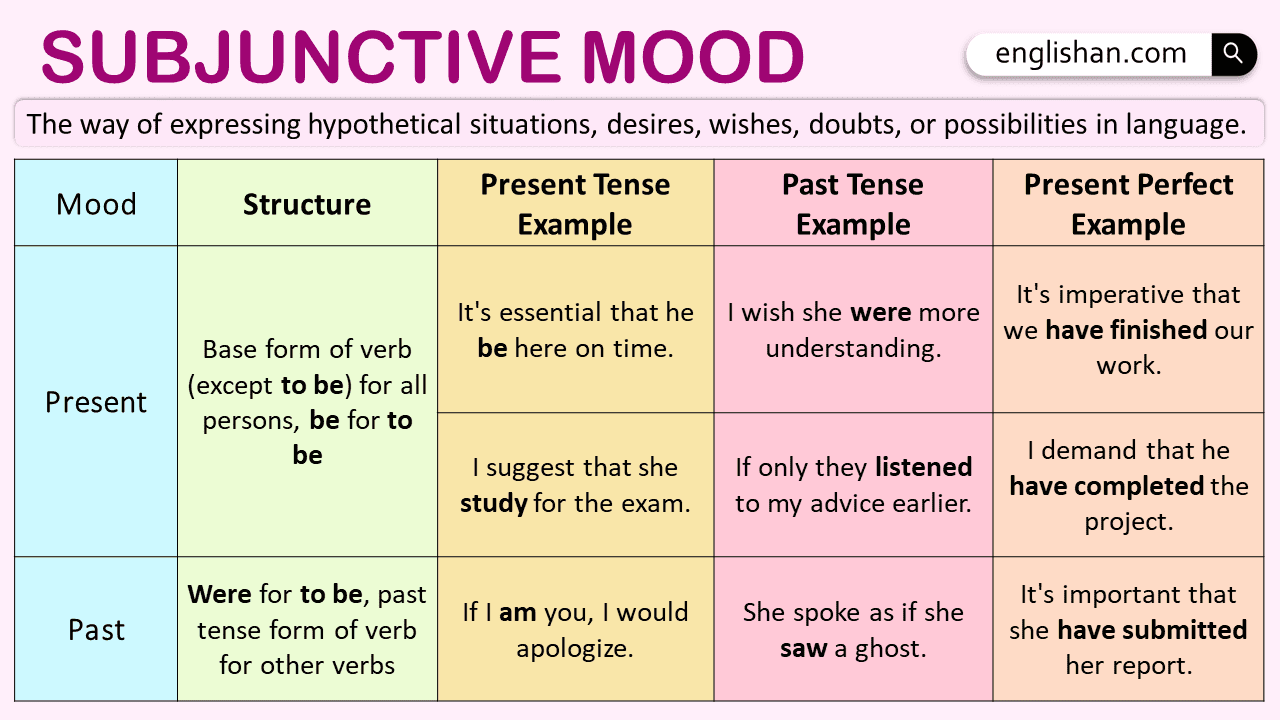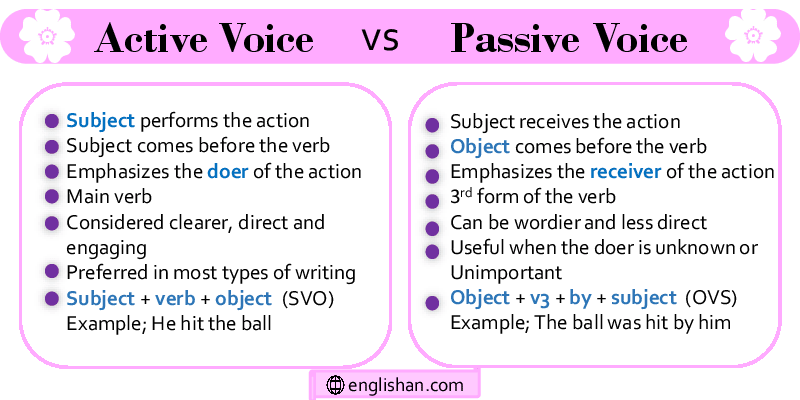Contents
A verb is an action word in a sentence that tells us what the subject is doing. It indicates actions (physical or mental) occurrences or states of being. There are many types of verbs, for example, action verbs, (transitive or intransitive) non-action verbs, (linking, auxiliary, model) regular irregular verbs, infinitive verbs, phrasal verbs, dynamic verbs, etc. But in this article, we will merely explain what transitive and intransitive verbs are their usage, and their identification with different examples.
What is a transitive verb?
A transitive verb is an action verb that requires or demands an object to receive the action. It transfers the action from a subject to a direct object. A direct object can be a noun a pronoun or a noun phrase that directly receives an action from the subject. Transitive verbs cannot be followed by prepositional phrases or adverbs but must be followed by a direct object. For example
He hits (verb) the ball (object).
So in this sentence, the action (hits) directly transfers from the subject (he) to the object (the ball)
A transitive verb (direct object) answers the question of “what” or “whom”. There can be two objects in a sentence (direct and indirect), and an indirect object answers the question of to whom or for whom. And if an action verb takes both direct and indirect objects it will be called a ditransitive verb. For example,
He sent her a letter.
An action (sent) transfers from the subject (he) to the direct object (a letter) and indirect object (her). (here Direct object answers the question of what he sent? and the Indirect object of to whom he sent a letter.
A transitive verb cannot stand alone without an object. For example,
He opened
(here opened is a transitive verb and without an object, this word cannot function, for example, you might be thinking, he opened what? So he opened is a transitive verb that demands an object (the door) to complete its meaning
I opened the door.
(Here the object ( the door) appears in the sentence to receive an action and now it makes complete sense)
And transitive verbs can be turned into a passive voice. For example,
She was reading a book. (Active voice)
The book was being read by her. (Passive voice)
Transitive verbs follow this pattern
Subject + verb + direct/indirect object
Examples;
She washed the dishes.
She uses an umbrella.
He will celebrate her birthday.
They are playing football.
I baked a cake.

What is an intransitive verb?
An intransitive verb is the opposite of a transitive verb that makes complete sense without an object. It can stand alone and doesn’t require an object. Intransitive verbs are usually followed by an adverb and a prepositional phrase. And they don’t answer the question of what or whom. An intransitive verb only tells what the subject is doing and it doesn’t transfer an action from subject to object. For example,
I studied at Princeton.
Here an intransitive verb (studied) is followed by a preposition (at) it is not followed by a direct object.
Intransitive verbs cannot be turned into passive voices because a sentence without an object can’t be changed into a passive voice.
Examples,
They are going to Peshawar. (preposition)
She speaks loudly. (adverb)
He is sleeping. (simple)
She sings beautifully. (adverb)
The library opens at 9 a.m. (preposition)
Transitive or intransitive verbs
Many verbs can be considered both transitive and intransitive. The presence or absence of a direct or indirect object indicates whether a verb is transitive or intransitive. For example,
England won the match. (Transitive)
England won. (intransitive)
She speaks English. (transitive)
She speaks very well. (intransitive)

Intransitive Words List
Agree
Become
Collapse
Cost
Cry
Die
Emerge
Explore
Fall
Float
Gallop
Grow
Happen
Hiccup / hic-cough
Jump
Knock (sound)
Laugh
Sail
Shake
Sigh
Skip
Slide
Smile
Sneeze
Spin
Sprint
Stagger
Stay
Vanish
Wade
Learn
Listen
March
Mourn
Occur
Pause
Peep
Pray
Emerge
Explore
Fall
Float
Gallop
Grow
Happen
Read
Recent
Remain
Scream
Shout
Sit
Sleep
Smell
Snarl
Soak
Spit
Squeak
Stand
Swim
Twist
Vomit
Wait
Walk
Wiggle
Yell
Revolt
Inquire
Kneel
Last (endure)
Lead
Leap
Left
Limp
Live
March
Move
Panic
Pause
Pose
Preen
Recline
Recent
Respond
Result
Rise
Run
Rush
Inquire
Kneel
Last (endure)
Lead
Leap
Left
Limp
Live
Arrive
Consist
Cost
Cough
Depend
Disappear
Exist
Fade
Fast
Fly
Go
Grow
Have
Hiccup / hic-cough
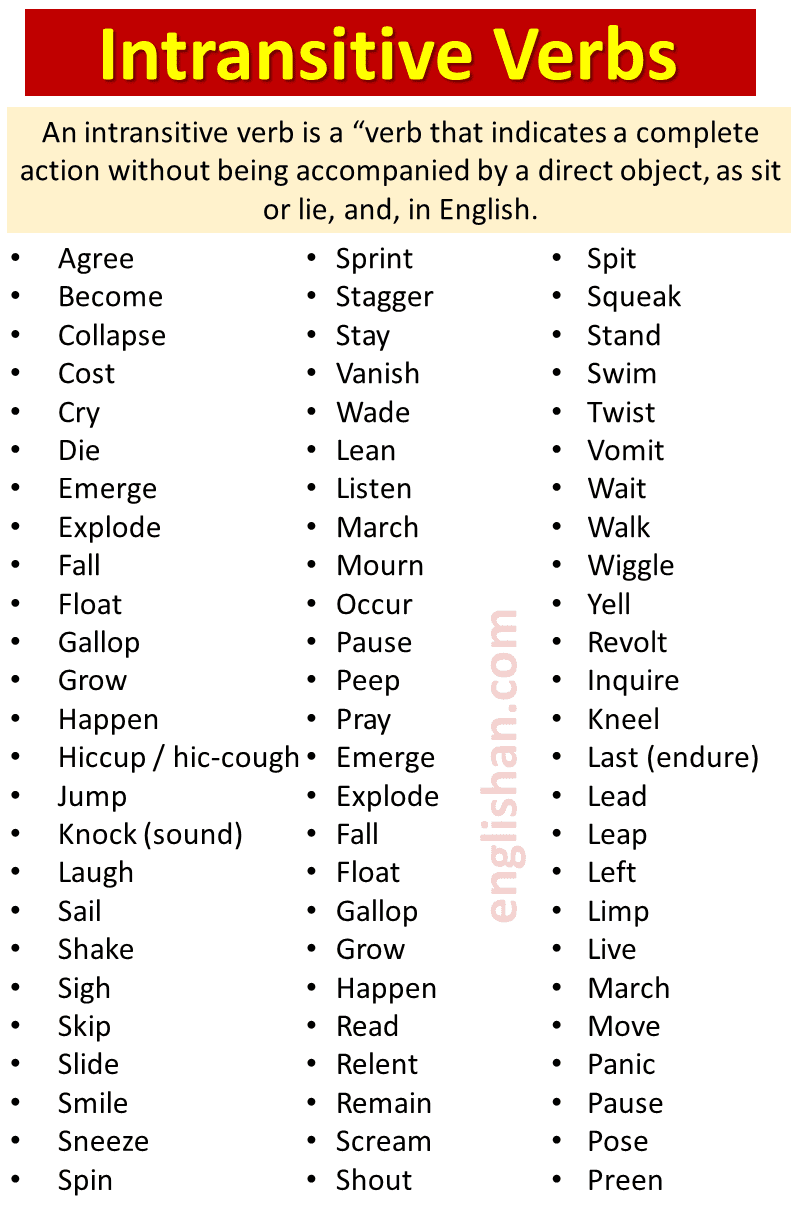
Transitive Words List
Instill
Empower
Praise
Prime
Jiggle
Active
Summon
Strengthen
Mold
Tempt
Cajole
Impassion
Reassure
Befriend
Smooth
Soak
Stroke
Intoxicate
Enlist
Hold
Enthuse
Gratify
Love
Relieve
Hug
Foster
Conjure
Draw
Lead
Involve
Turn on
Grab
Ignite
Impress
Inflate
Teach
Push
Preach
Elate
Bedazzle
Chide
Kindle
Assure
Soothe
Melt
Worship
Embrace
Intoxicate
Enlist
Cuddle
Succor
Shine
Appraise
Relax
Hug
Engage
Pull
Lure
Guide
Coax
Tease
Excite
Squeeze
Plead
Beg
Modify
Buy
Smother
Obliterate
Wrestle
Reduce
Trick
Engulf
Warp
Destabilize
Dominate
Seduce
Flirt
Excite
Juice
Touch
Plead
Mystify
Convert
Change
Marshall
Overrun
Bury
Eliminate
Mess with
Devalue

FAQs:
Transitive verbs need a direct object to complete their meaning.
1. Example: She reads a book.
(Here, “reads” needs the object “a book” to make sense.)
Intransitive verbs do not need an object. The action is complete on its own.
2. Example: He runs fast.
(Here, “runs” does not need an object; the action is complete by itself.)
So, transitive verbs need something to act on, but intransitive verbs do not.
Here are 12 examples of intransitive verbs:
1. Run
2. Sleep
3. Laugh
4. Arrive
5. Jump
6. Cry
7. Swim
8. Dance
9. Talk
10. Wait
11. Shout
12. Wander
These verbs do not need an object to complete their meaning.
The sentence “I am ten years old” uses the verb “am,” which is a linking verb.
A linking verb connects the subject (I) to more information about it (ten years old).
So, it’s neither transitive nor intransitive—it’s a linking verb.
Transitive phrasal verbs need an object to make sense.
Example: She turned off the light.
(Here, “turned off” needs the object “the light.”)
Intransitive phrasal verbs do not need an object.
Example: The car broke down.
(Here, “broke down” doesn’t need an object.)
In short:
Transitive = Needs an object.
Intransitive = Doesn’t need an object.
You May Also Like
